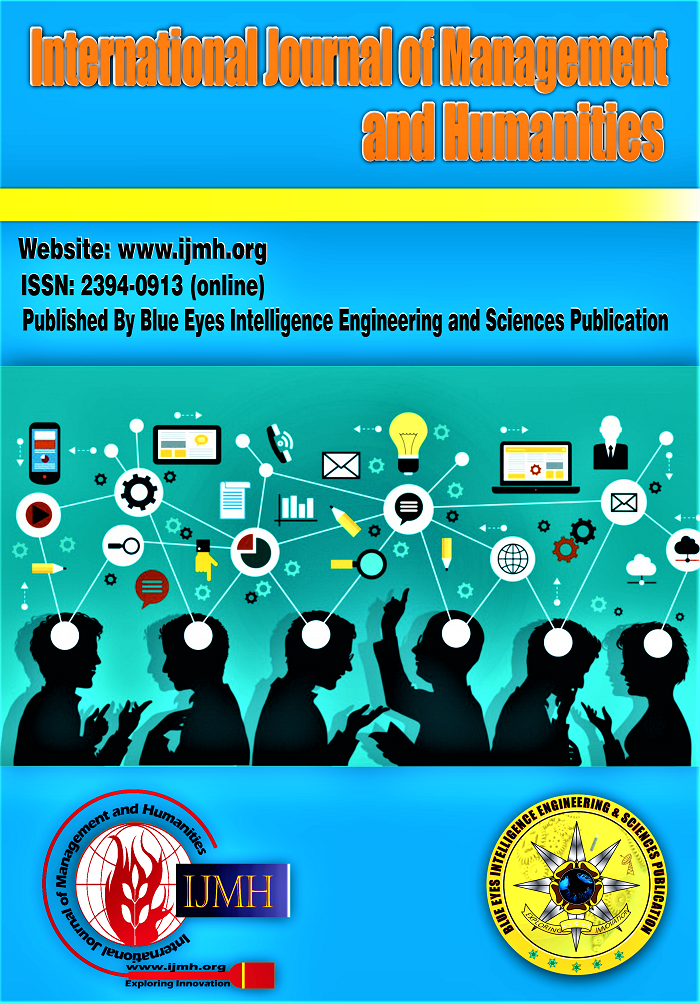A Study on Student Engagement among MBA Graduates
Main Article Content
Abstract
This study aims to understand the moderating role of demographic and behavioural variables on student engagement among MBA graduates. Utrech Work Engagement Scale for Students (UWES-S) was used to assess the student engagement. Mann-Whitney U test and Kruskal Wallis test were applied to find out the moderating role of the demographic and behavioural factors. It was found out that gender, medium of instruction at school level, frequency of late coming and interaction level in the class discussions had an impact over student engagement, and variables like family monthly income and the type of occupation of the parents did not impact the student engagement.
Downloads
Article Details
Section
How to Cite
References
Schaufeli, W. B., Salanova, M., González-Romá, V., & Bakker, A. B. (2002). The measurement of engagement and burnout: A two sample confirmatory factor analytic approach. Journal of Happiness Studies, 3(1), 71-92. https://doi.org/10.1023/A:1015630930326
Schaufeli, W. B., Martínez, I. M., Pinto, A. M., Salanova, M., & Bakker, A. B. (2002), Burnout and Engagement in University Students A Cross-National Study, Journal of cross-cultural psychology 33 (5), 464-481. https://doi.org/10.1177/0022022102033005003
Taylor, L. & Parsons, J. (2011). Improving Student Engagement. Current Issues in Education, 14(1). Retrieved from http://cie.asu.edu/
Carlson, S. (2005)., The Net Generation goes to college, The Chronicle of Higher Education Section: Information Technology, 52(7)
Oblinger, D. G., and P. Hagner. 2005. Seminar on educating the Net Generation. Presented at EDUCAUSE, Tempe, AZ, August
Barnes, Kassandra; Marateo, Raymond C.; and Ferris, S. Pixy (2007) "Teaching and Learning with the Net Generation ,"Innovate: Journal of Online Education: Vol. 3 : Iss. 4 , Article 1. Available at: https://nsuworks.nova.edu/innovate/vol3/iss4/1
Marks HM, Student Engagement in Instructional activity: Patterns in the elementary, middle and high school years, American Educational Research Journal 37, No1 pp.153-184 https://doi.org/10.3102/00028312037001153
Fredricks, J. A., Blumenfeld, P. C., & Paris, A. H. (2004). School engagement: Potential of the concept, state of the evidence. Review of Educational Research, 74, 59–109. https://doi.org/10.3102/00346543074001059
Salanova, M.,Schanfeli; W.B.Martinez, I., and Bresco, E. (2010). “How obstacles and facilitators predict academic performance: The mediating role of student burnout and engagement”. Anxiety, Stress and coping. Volume 23, Issue 1, 53-70. https://doi.org/10.1080/10615800802609965
Kuh, G.D., Cruce, T., Shoup, R., Kinzie, J., and Gonyea, R.M. (2007, April). “Unmasking the effects of student engagement on college grades and persistence”. Paper presented at the Annual Meeting of the American Educational Research Association, Chicago, IL
Astin, A.W. (1985), “Achieving Educational Excellence: A Critical Assessment of Priorities and Practices in higher education” Pg 135-136
Günüç, S., & Kuzu, A. (2014). Factors influencing student engagement and the role of technology in student engagement in higher education: campus-class-technology theory. Turkish Online Journal of Qualitative Inquiry, 5(4), 86-113. https://doi.org/10.17569/tojqi.44261
Tight, M. (2020). Student retention and engagement in higher education. Journal of further and Higher Education, 44(5), 689-704. https://doi.org/10.1080/0309877X.2019.1576860
Strengths and Weaknesses of Education 4.0 in the Higher Education Institution. (2019). In International Journal of Innovative Technology and Exploring Engineering (Vol. 9, Issue 2S3, pp. 511–519). https://doi.org/10.35940/ijitee.b1122.1292s319
Ali, N. S., Tentama, F., & Adjam, F. A. (2020). Examining Construct Validity and Reliability of the Aggressiveness Scale. In International Journal of Management and Humanities (Vol. 4, Issue 6, pp. 99–103). https://doi.org/10.35940/ijmh.f0623.024620
Relationship of Emotional Intelligence, Workplace Spirituality and Performance. (2019). In International Journal of Recent Technology and Engineering (Vol. 8, Issue 4S3, pp. 359–362). https://doi.org/10.35940/ijrte.d1089.1284s319
Khera, Dr. S. (2022). Innovative Teaching Skills: A Necessity in the Era of Globalization. In Indian Journal of Social Science and Literature (Vol. 2, Issue 2, pp. 20–24). https://doi.org/10.54105/ijssl.b1046.122222
Weeratunga, A., & Singh, J. S. K. (2019). Influence Of Emotional And Spiritual Intelligence Towards Intention To Stay By Generation Y Employees In The Information And Communication Technology Sector In Malaysia: The Mediating Role Of Perceived Organizational Support. In International Journal of Engineering and Advanced Technology (Vol. 8, Issue 5c, pp. 954–961). https://doi.org/10.35940/ijeat.e1135.0585c19





